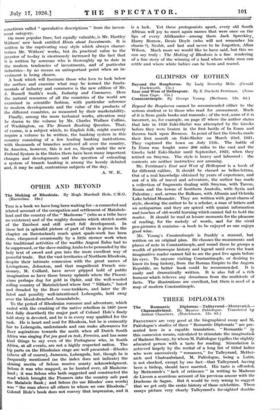OPHIR AND BEYOND
The Making of Rhodesia. By Hugh Marshall Hole, C.M.G. (Macmillan. ltts.)
Tnis is a book we have long been waiting for—a connected and related account of the occupation and settlement of Matabele- land and the country of the " Mashonas " (who as a tribe have no existence) and of the mighty domains which stretch north of the Zambesi and still await full development. In these last (a splendid picture of part of them is given in the chapter on Barotseland) much quiet spade-work has been done, chequered occasionally by a little sterner work when the traditional activities of the warlike Angoni Zulus had to be suppressed, or the slave-raiding Arabs to be persuaded by the holy text of sword and gun into the more excellent way of peaceful trade. But the vast territories of Northern Rhodesia, despite their intimate connexion with the great names of Livingstone, Johnston, and that magnificent French mis- sionary, M. Coillard, have never gripped hold of public imagination as have those breezy uplands where the Phoeni- cians perhaps dug for gold in Ophir, and the well-wooded rolling country of Matabeleland where first " Silikats," hated and dreaded by the Boer voor-trekkers, and later the ill- fated and possibly well-intentioned Lobengula, held sway over the blood-drenched Amandabele.
To the period of Rhodesian romance and adventure, which ended with the crushing of the native rebellion in 1897 (now first fully described) the major part of Colonel Hole's finely told story is devoted, and he is in every way qualified for the task. He is heart and soul for Rhodesia, but he is eminently fair to Lobengula, understands and can make allowances for Boer aspirations towards the north when all Dutch South Africa was singing Fat jou good en trek, Ferreira, and has some kind things to say even of the Portuguese who, in South Africa, at all events, are not a highly respected nation. The big parts on the Rhodesian stage are well presented—Rhodes (above all of course), Jameson, Lobengula, but, though he is frequently mentioned (as the index does not indicate) the shining merits of Selous receive scanty acknowledgment. Selous it was who mapped, as he hunted over, all Mashona- land ; it was Selous who both suggested and constructed the road which brought the Pioneers into the country safe past the Matabele flank ; and Selous (to use Rhodes' own words) was " the man above all others to whom we owe Rhodesia.' Colonel Hole's book does not convey that imprecision, and it is a lack. Yet these protagonists apart, every old South African will joy to meet again names that were once on the lips of every Afrikander—among them Jack Sprecklcy, Harry Borrow, Denis Doyle (who will not remember his charm ?), Nesbit, and last and never to be forgotten, Allan Wilson. Much more we would like to have said, but this we can say truly : The Making of Rhodesia is a fine rendering of a fine story of the winning of a land where white men can settle and where white babies can be born and reared.










































 Previous page
Previous page